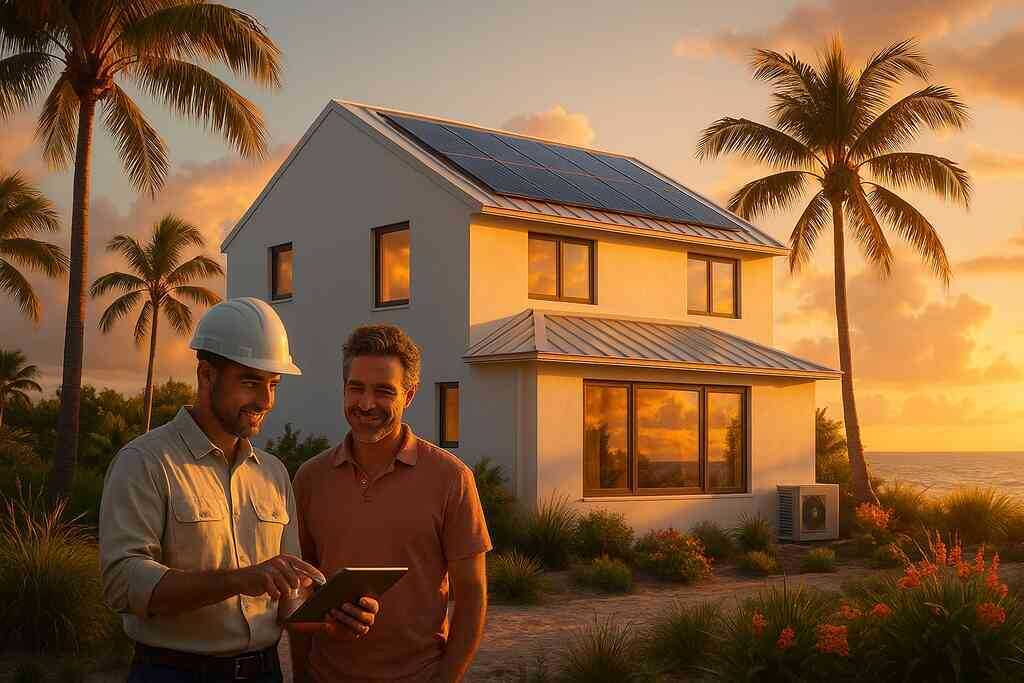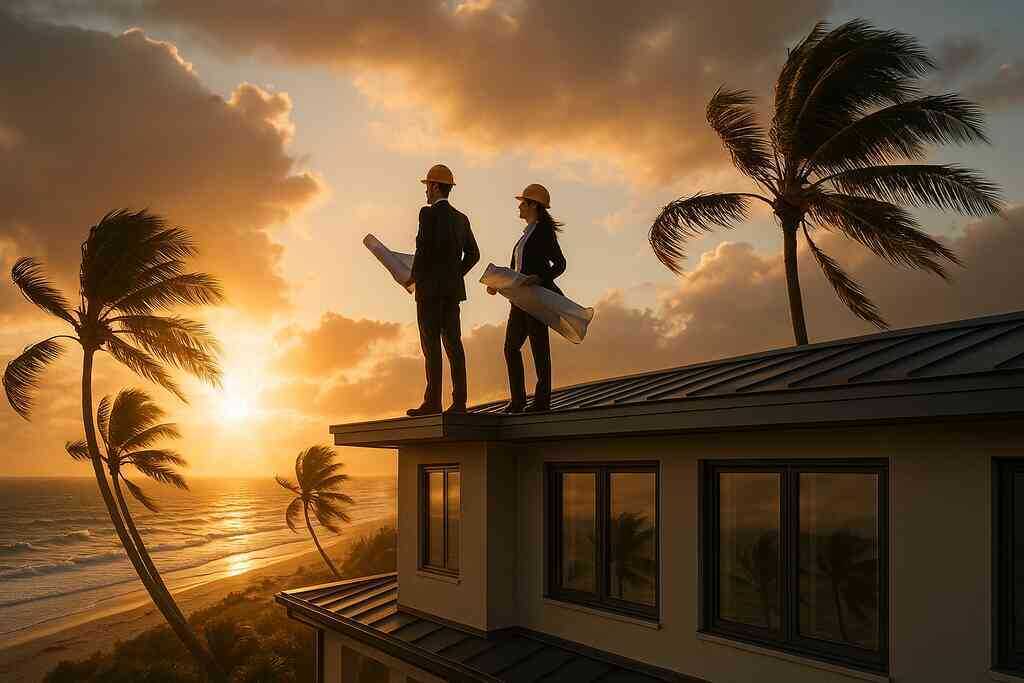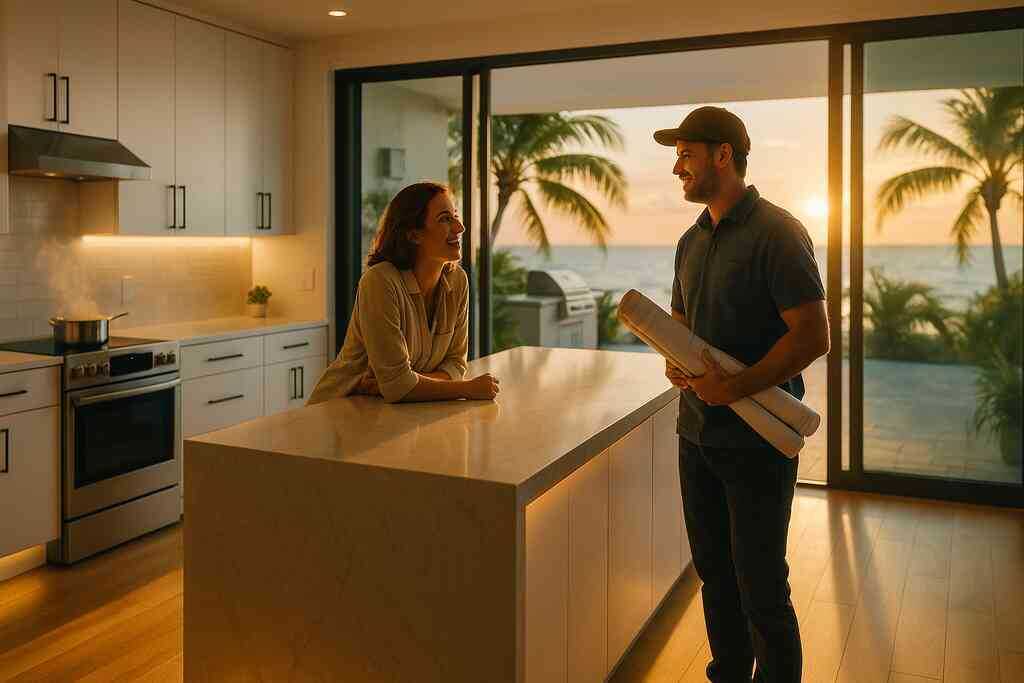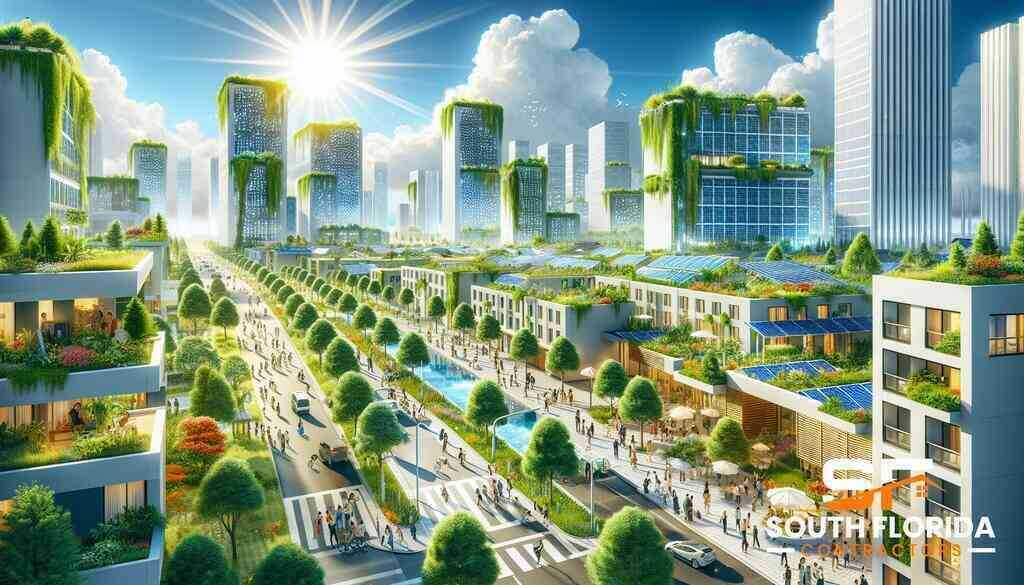
Complexities of Sustainable Construction Decoded by South Florida Contractors in Nassau County
October 24, 2025
Decoding the Foundations of Sustainable Construction
Green Building Principles: A New Framework for Nassau County
In the realm of sustainable construction in South Florida, the establishment of green building principles marks a significant pivot towards more eco-friendly practices. Nassau County stands at the forefront, adopting frameworks that emphasize energy efficiency and low environmental impact. By integrating sustainable building practices, contractors aim to reduce carbon emissions and improve overall building sustainability. This approach is not only beneficial for reducing ecological footprints but also enhances the livability and value of properties. The principles laid down serve as a blueprint for other counties, demonstrating practical and profitable pathways to sustainable development.
Sourcing Sustainable Materials: Strategies and Challenges
The journey toward sustainable construction is riddled with challenges, one of the foremost being the sourcing of sustainable materials. To address this, contractors in South Florida are innovating with strategic sourcing methods. They focus on local and recycled materials, which reduces transportation emissions and promotes regional economic growth. Collaboration with suppliers is key, ensuring that materials meet high sustainability standards. However, contractors face hurdles such as higher costs and limited availability of certain eco-friendly materials. Nevertheless, these challenges incentivize innovation, driving the advancement of sustainable materials sourcing near West Palm Beach and broader market development.
LEED Certification: A Benchmark for Eco-Friendly Design
LEED certification serves as a gold standard in eco-friendly design and construction, offering a benchmark for sustainability. For contractors aiming to achieve this certification, integrating techniques that adhere to green building criteria is crucial. These criteria range from optimizing energy performance to ensuring water conservation. The focus on attaining LEED credentials demonstrates a commitment to advanced environmental stewardship. By partnering with LEED certified contractors in South Florida, clients can be assured of adherence to rigorous eco-friendly standards. This certification not only enhances the credibility of projects but also extends their market appeal and operational efficiency.
Advanced Eco-Friendly Construction Techniques
Pioneering Hybrid Construction Methods for Energy Efficiency
Hybrid construction methods are redefining energy-efficient home building techniques by blending conventional and modern sustainable construction technologies. These methods focus on optimizing insulation, structural integrity, and resource utilization to achieve minimal energy consumption. Nassau County contractors employ these techniques to create homes that are not only robust but also sustainable, aligning with sustainable design strategies. By integrating these methodologies, contractors reduce energy requirements, thereby cutting costs and advancing green construction in South Florida. Homeowners benefit from long-term savings and an enhanced property value, proving that energy efficiency can seamlessly parallel innovative design.
Innovative Green Technology Applications in South Florida
South Florida is a hotspot for innovative green technology solutions, leveraging advanced systems to propel eco-friendly construction forward. This technological evolution includes the adoption of smart home systems, renewable energy installations, and sustainable materials sourcing, transforming how properties are built and operated. Contractors are utilizing these innovations to meet the increasing demand for efficient, sustainable spaces, ensuring environmentally responsible construction. By integrating technologies such as smart thermostats and solar panels, South Florida contractors are paving the way for sustainable architecture in Florida. These solutions not only improve energy efficiency but also enhance the overall living experience, blending high-tech comforts with eco-conscious design.
Water Conservation and Climate-Responsive Strategies
In the face of climate change, water conservation and climate-responsive building solutions are critical components of sustainable construction in South Florida. Contractors are employing systems like rainwater harvesting, greywater recycling, and drought-resistant landscaping to address water scarcity and reduce consumption. These strategies are crucial for maintaining sustainable urban development in areas prone to climate fluctuations. In addition, environmentally responsible builders are designing structures with climate adaptability in mind, ensuring that buildings are resilient to local weather patterns. This commitment to sustainable project management strategies enables builders to create structures that not only withstand environmental challenges but also contribute positively to the ecological balance.
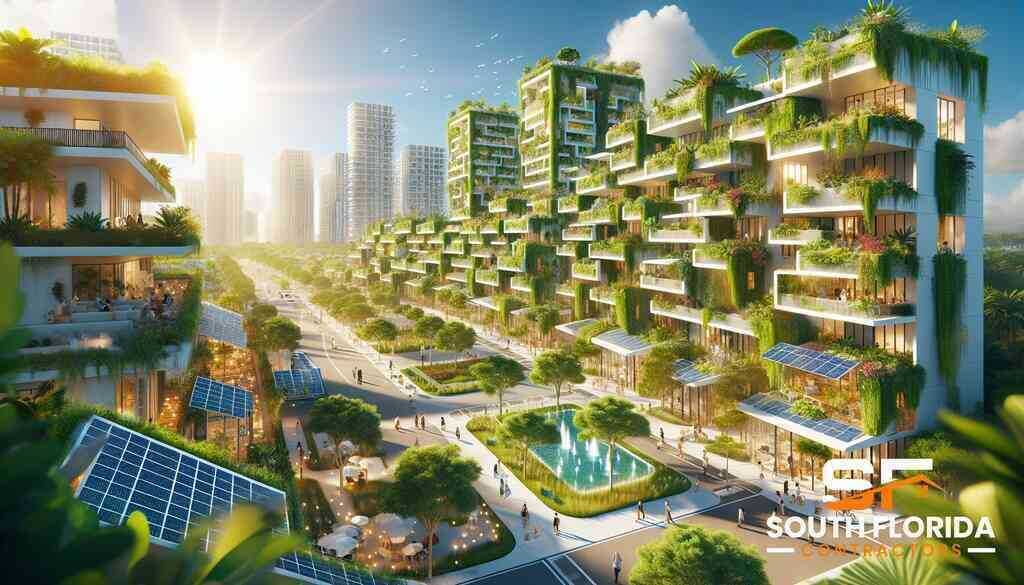
Sustainability in Remodeling and Renovation Projects
Eco-Friendly Remodels: Transforming Spaces Responsibly
Eco-friendly remodels are gaining momentum as South Florida homeowners realize the benefits of sustainable upgrades. Transforming spaces responsibly involves the selection of non-toxic materials, energy-efficient lighting, and the integration of sustainable practices that minimize waste and environmental impact. Leveraging eco-friendly home remodels allows homeowners to rejuvenate their spaces while aligning with broader sustainability goals. Contractors in South Florida are champions of these initiatives, incorporating innovative practices such as using reclaimed materials and local sourcing to reduce ecological footprints. The commitment to sustainable remodeling not only enhances the aesthetic value of homes but also contributes to the health and well-being of residents by creating healthier indoor environments.
Integrating Renewable Energy into Residential Developments
The integration of renewable energy solutions into residential developments is at the forefront of sustainable construction in South Florida. Utilizing solar panels, wind energy, and other renewable technologies are key components in creating energy-efficient homes. Implementing renewable energy solutions in residential projects significantly reduces the dependency on non-renewable energy sources, offering substantial long-term cost savings. Contractors are increasingly offering solutions that include solar installations, smart home systems that optimize energy use, and energy storage solutions that ensure consistency and reliability. This shift not only promotes environmental responsibility but also provides homeowners with a more self-sufficient and resilient energy setup, capable of adapting to future energy demands and climatic conditions.
Zero-Waste Practices: Revolutionizing Construction Lifecycles
Zero-waste practices in construction are revolutionizing how projects are executed, focusing on minimizing landfill contributions and maximizing resource efficiency. Contractors are adopting zero-waste construction techniques by meticulously planning project workflows to eliminate excess waste and promote recycling throughout the construction lifecycle. These practices challenge traditional construction norms by emphasizing closed-loop systems where materials are continuously reused and waste is meticulously processed for minimal environmental impact. By fostering a culture of sustainability and innovation, South Florida contractors lead the way in reducing the construction industry’s ecological footprint. This approach not only supports sustainable development goals but also enhances the cost-effectiveness of projects by minimizing resource consumption and waste-associated expenses.
The Future of Sustainable Urban Development
Biophilic Design: Merging Nature with Construction
Biophilic design represents a revolutionary shift in sustainable urban development, embracing nature as a core element within construction frameworks. This approach seeks to merge natural elements with architectural design, enhancing human health and biodiversity. Incorporating biophilic design involves strategies such as green roofs, vertical gardens, and the use of natural light to create spaces that feel more connected to the environment. In biophilic design in urban development, contractors in South Florida are leading the way, cultivating environments that foster emotional well-being and ecological balance. By blending the beauty of nature with urban settings, these designs not only offer aesthetic appeal but also contribute to energy savings and improved air quality, proving that architectural progress can harmonize with environmental preservation.
Holistic Approaches to Environmentally Responsible Construction
Adopting a holistic approach to environmentally responsible construction involves considering all facets of building design and operation. This means assessing the environmental impact of materials, energy consumption, and waste management throughout the entire building lifecycle. Contractors focus on integrating sustainable practices at every stage, from design and material selection to construction and maintenance. Such approaches often include the use of renewable materials, efficient energy systems, and waste reduction strategies. Moreover, holistic construction techniques prioritize occupant health and comfort by improving indoor air quality and incorporating natural elements. By fostering an understanding of modern sustainable construction, South Florida contractors are setting benchmarks in the industry for eco-conscious innovation, ensuring that constructions not only meet today’s needs but also contribute positively to future ecological challenges.
Exploring Sustainable Urban Planning and Development
Sustainable urban planning encompasses a broad range of strategies aimed at creating livable, resilient, and environmentally sustainable communities. In South Florida, planners and contractors are exploring innovative strategies that consider land use, transportation, and infrastructure to minimize environmental impact. Such strategies also include the integration of green spaces within the urban fabric to enhance biodiversity and community well-being. Key elements of sustainable urban planning involve reducing carbon footprints through efficient public transport systems, promoting pedestrian-friendly zones, and implementing waste reduction programs. By prioritizing sustainable architecture in Florida, these initiatives aim to create a balance between development needs and ecological stewardship, fostering urban environments that are prepared to thrive amid future challenges. This commitment to sustainable urban development not only elevates the quality of life for residents but also serves as a model of responsible growth.
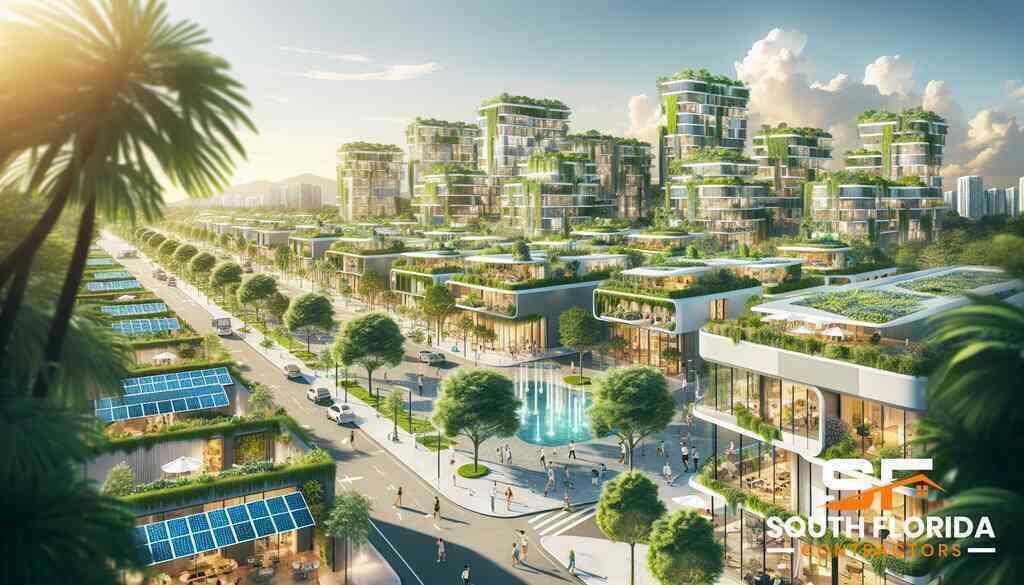
Embarking on a Sustainable Journey
Understanding the Role of Contractors in Green Construction
Contractors play a pivotal role in the effective implementation of green construction methods. In South Florida, these professionals are redefining traditional general contractor roles by integrating eco-friendly practices into every stage of the building process. To master sustainable construction, contractors must possess a deep understanding of environmental regulations, energy-efficient techniques, and sustainable materials. Additionally, they are responsible for coordinating with architects, suppliers, and clients to ensure that sustainability is at the forefront of each project. This alignment not only facilitates compliance with green building standards but also enhances public perception and trust in sustainable development. By embracing these comprehensive roles, contractors are essential in driving the transition towards more eco-conscious building practices.
Committing to a Sustainable Construction Lifestyle
Adopting a sustainable construction lifestyle extends beyond the projects themselves; it embraces a mindset that values long-term ecological preservation over short-term gain. Contractors in South Florida must lead by example, promoting sustainable choices in their operations and advocating for the broader acceptance of eco-friendly construction in South Florida. This commitment involves continuous education, innovative practices, and collaborations with environmentally conscious partners. Moreover, homeowners are encouraged to partake in this sustainability journey by engaging in projects that focus on renewable energy and resource efficiency. By fostering a culture of sustainability within the industry and beyond, these initiatives create resilient communities that prioritize ecological balance. Ultimately, the dedication to living a sustainable construction lifestyle benefits both the environment and future generations, ensuring a harmonious coexistence with nature.
Frequently Asked Questions
Question: How do South Florida Contractors ensure their projects adhere to sustainable construction practices?
Answer: South Florida Contractors are committed to implementing sustainable construction practices by integrating green building technology and eco-friendly construction solutions. We focus on energy-efficient home building and the use of sustainable materials sourced locally to reduce environmental impact. Through strategic partnerships with suppliers, we ensure that all materials meet high sustainability standards. By employing contractors with LEED certification, we further demonstrate our commitment to adhering to rigorous eco-friendly standards. This not only enhances the credibility of our projects but also extends their market appeal and operational efficiency.
Question: What challenges do contractors in Nassau County face when sourcing sustainable materials, and how do South Florida Contractors address them?
Answer: Contractors in Nassau County face several challenges, including higher costs and limited availability of eco-friendly materials. To overcome these hurdles, South Florida Contractors adopts strategic sourcing methods, focusing on recycled and locally sourced materials. This approach not only reduces transportation emissions but also supports regional economic growth. Despite the cost implications, we prioritize these sustainable materials to drive market development and innovation, ensuring our projects meet the highest sustainability standards, particularly in areas like West Palm Beach.
Question: How do hybrid construction methods contribute to energy efficiency, and what role do they play in the Complexities of Sustainable Construction Decoded by South Florida Contractors in Nassau County?
Answer: Hybrid construction methods play a crucial role in advancing energy efficiency by combining conventional and modern sustainable construction technologies. These methods optimize insulation, structural integrity, and resource utilization, thereby achieving minimal energy consumption. In Nassau County, our contractors implement these techniques to construct robust yet sustainable homes. By reducing energy requirements, these methods lead to long-term savings and enhanced property value, proving that energy efficiency can seamlessly integrate with innovative design strategies.
Question: How do South Florida Contractors integrate renewable energy into residential projects to promote sustainability?
Answer: South Florida Contractors actively integrates renewable energy solutions, such as solar panels and wind energy systems, into residential developments to create energy-efficient homes. By reducing dependency on non-renewable energy sources, these solutions offer substantial long-term cost savings. Our contractors provide options for solar installations, smart home systems that optimize energy use, and energy storage solutions to ensure consistent and reliable power. This shift towards renewable energy not only promotes environmental responsibility but also ensures a more self-sufficient and resilient energy setup for homeowners.
Question: What role does biophilic design play in the sustainable urban development strategies implemented by South Florida Contractors?
Answer: Biophilic design is pivotal in our sustainable urban development strategies as it seeks to merge natural elements with construction frameworks, enhancing human health and biodiversity. By incorporating features such as green roofs, vertical gardens, and natural light, we create spaces that foster a connection with the environment. Our commitment to biophilic design not only offers aesthetic appeal but also contributes to energy savings and improved air quality. This approach aligns with our goal of proving that architectural progress can harmonize with environmental preservation.
